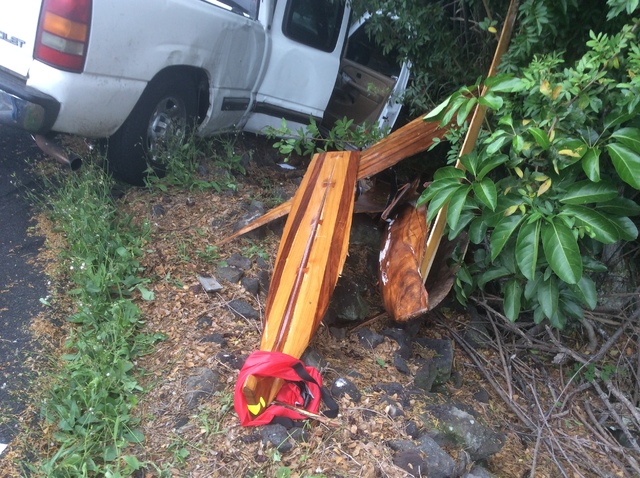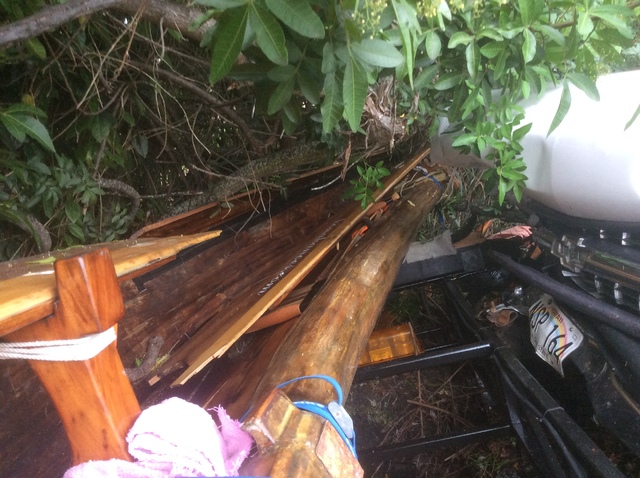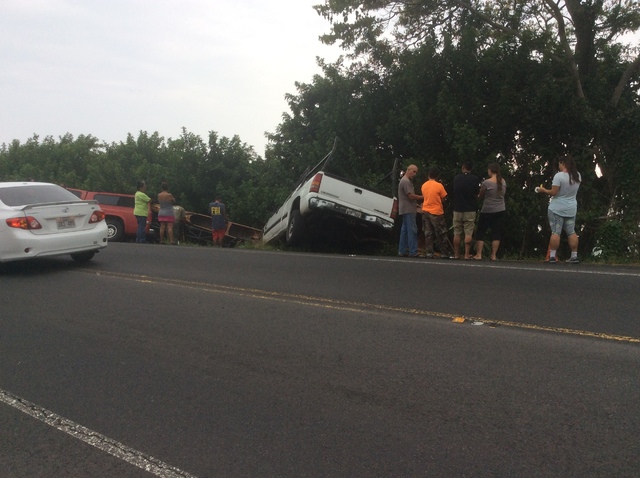A Milolii canoe club is without means to continue competing in its first season following an auto accident that left a $100,000 koa waa in splinters along the highway in South Kona. ADVERTISING A Milolii canoe club is without means
A Milolii canoe club is without means to continue competing in its first season following an auto accident that left a $100,000 koa waa in splinters along the highway in South Kona.
The Keahounui, built by Bill Rosehill, won gold in novice divisions in both women’s and men’s races of the Moku O Hawaii Outrigger Canoe Racing Association event last Saturday in Kailua-Kona. But the six man, 45-foot craft was utterly destroyed and the tongue of its trailer jammed through the cab of the towing pickup after it was struck from behind by another full-size pickup on Wednesday evening.
The canoe had been undergoing maintenance and tweaks at Rosehill’s shop in preparation for Hilo races. Dave Wallace, a member of the newly formed Milolii Canoe Club, had picked up the canoe and was parked “well off” on the road shoulder so he could go back and close a gate when the pickup approached at high speed and slammed into the trailer, Wallace said.
The waa was launched like a missile, and a $10,000 trailer the club had just fundraised for and purchased was driven into the passenger seat of Wallace’s truck, destroying his $2,000 bicycle in the process.
A 52-year-old Ocean View man whom police did not identify because he was not arrested was cited for driving without a license or insurance in the 4:40 p.m. accident at mile marker 101.
“We’re looking at the loss of a season; we’re 48 hours from a race and we have no canoe,” said Kaialii Kahele, director of Paa Pono Milolii, a community organization devoted to preserving the area’s heritage.
The paddler’s club competed in some of the first Moku races 81 years ago but had since dissolved. Rekindling the club and re-entering the Moku has been a huge source of pride for the community, Kahele said.
“Milolii is small and we don’t have a lot. But being in the Moku brought back a lot of magic,” Kahele said. “I’d hate to see that momentum lost.”
The 400-pound waa was being loaned by Rosehill while he repairs the club’s own koa canoe, the Malolo. Rosehill said that trees large enough to build the dugout Keahounui just aren’t available anymore.
“It’s named after my sister,” he said. “It’s more than just culture; to me, it’s family.”
Wallace’s auto insurance company declined to cover the damage. The club’s insurance does not cover the canoe either, said Kahele, who said he’s been told by other clubs that coverage for a koa canoe runs about $2,500 a year.
Club member Linda Lesley said she was saddened by the loss of a piece of history that can take up to seven years to build.
“DLNR no longer allows us to harvest the dead trees (needed to build a replacement),” she said.
The club has been in contact with other paddling organizations and it is possible one of them will be able to lend a waa that will allow the Milolii paddlers to finish their inaugural season.
“The problem is, not many clubs have koa canoes, and if they do, they race in them,” Kahele said. “You have to have a koa canoe to race in the Moku.”
Tax deductible donations to the club can be made at www.paaponomilolii.org.






